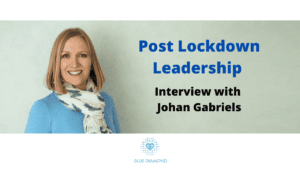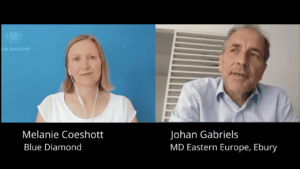
This interview with Johan Gabriels forms part of the Blue Diamond Post Lockdown Leadership Review.
We discuss what great leadership looks like, how to practice self-leadership and leadership traits for career success.
In addition we look at anticipated changes in working practices and key skills for success in the post lockdown economy.
Watch the interview with Johan Gabriels here
Post Lockdown Leadership Review – Interview with Johan Gabriels
Melanie Coeshott (MC) – Good afternoon Johan. Welcome to Blue Diamond.
I’ve just been thinking about when we worked together – it must have been 15-20 years ago. And not just at one place, but at two different companies. So, tell me, what do you do today and what have you been up to in last couple of years?
Johan Gabriels (JG) – Thanks. Well, it’s good to be back after fifteen or twenty years!
Today, I’m the Managing Director of Ebury for Eastern Europe. Ebury is a Fintech company headquartered in the UK and we do everything around international payments and foreign currency management for SMEs and large corporates.
MC – Great. I know you’ve held a number of different leadership positions and other senior management positions throughout the years.
What does great leadership mean to you?
JG – Well, I think, as a leader you always have a positive intention and a certain version.
I’m, a leader who likes to work with people, so I want to show that I’m available for my team, to teach them, to mentor them.
For me, it’s about positive intentions and it’s about having a true interest in people.
And also listening to people. I think the latter is definitely the case with the millennium generation.
That’s what I would qualify as great leadership.
MC – Sounds like some great elements there.
What do you interpret by the term self-leadership and how do you practice this?
JG – Self-leadership for me relates to personal improvement and pushing your own borders.
I think I’ve done that a couple of times throughout my career. I used to work for Fast Moving Consumer Good companies like Mars and Pepsi. I think from one day to another I moved from FMCG to Capital One, a monoline credit card company based in the US.
But I liked their vision, I liked their leaders and it was completely out of my comfort zone.
I learned a lot. I think I probably also made a lot of mistakes. But they allowed me to fail. And more importantly, to learn from it.
That was in the US, then I moved back, lived in different countries and I challenged myself (and my family sometimes) and pushed my borders.
But in that way, I became a more mature manager, I would say.
So self-leadership is about personal improvement to keep on learning.
MC – Great.
What signs of leadership do you look for from staff within your business?
I guess, what demonstration of leadership skills would make you consider somebody for promotion?
JG – The main reason that I will hire somebody is their motivation.
If I have to choose between the smartest one in the class, but not that motivated. And maybe the average one, who’s super-motivated, I always prioritise motivation.
It’s also somebody who comes up with ideas. Okay, nine out of ten ideas might not work. But for that one successful idea, I don’t want them to give up.
It is again creating ideas and going for them. Learning from this. I would also support them here.
They can fail in my eyes. I have a strange phrase – “they can fail in style” – meaning it’s okay to get it wrong, as long as they learn from it and don’t do it a second time.
But essentially, it’s about motivation.
Being a team player is also important – they need to have a certain empathy with others.
These are the kind of things I’m looking for – someone who fits well in the team, positive intent and is super motivated, is probably the person that I’d consider for promotion.
MC – Great, so that sounds like a well-rounded individual then.
So, we’ve obviously gone through a lot of changes in recent weeks and months and there’s probably more changes to come. Sadly, none of us has a crystal ball.
What changes do you anticipate in terms of working practices in the next twelve months and beyond?
JG – I think it’s a lifetime experience with most of the world now working from home. And it kind of works, at least on a limited basis. I think we will definitely go to a situation where a couple of days per week or a week per month, people can work from home. I think that there’s going to be a change,
Maybe it’s even an opportunity for less traffic jams. I read somewhere that if twenty percent of the people work from home that you actually solve fifty percent of the traffic jams because it’s obviously not linear equation. So that’s definitely something.
Also, the way that we talk with clients may change. I guess sometimes it’s important that we see clients face to face definitely and that could remain. But occasionally. Again, in order to avoid traffic jams and to save time, we can use more video conferences and I think the technology is definitely there to use that.
We might also see an improvement in people’s work / life balance better. I’ve seen that some of my people are very happy to work from home. It is probably the more introverted that are OK with this.
The extroverts that need the noise and the people around them to motivate them, are probably the more willing to go back to work.
But having now that choice might increase the overall productivity and motivation of our staff.
MC – Yeah great, so it sounds like more of the same, but probably some different nuances as well as we integrate back into the workplace.
JG – The people will remember this 2020 working from home and will refer to it and the positive things about it.
MC – Yes, definitely. Such an unprecedented time.
How will you lead yourself and others through his time?
JG – If I look at my team, I have my morning team touchpoints, to make sure that everybody is awake and is kind of dressed properly, because I think this is important when working from home. It’s not your office, it’s actually the place you are sleeping, so you need a difference between when you work and when you stop work.
So, I have some kind of rituals in a way to have a call with everybody in the morning and again with everybody in late afternoon, to support this delineation.
And then I have my regular 1:1s with individuals or the teams.
They also know they can contact me if they need me for anything urgent. So, all these things are all in place.
We also do some pulse checks and surveys to learn how we can improve. We make sure that they all have the equipment they need at home, to be as productive as possible.
Working in a fintech we can actually measure a lot of things generally, and it’s based on these analytics and these KPIs that we’re trying to lead them through this period.
MC – Right.
What skills you save will be the most important to help us through this period?
I think being agile is very important. Not only as an individual, but also for companies.
When all this started in early March, we had to react very quickly. Our company had to react very quickly – de-risk the balance sheet, looking at cash, looking at the capital. The whole organization had to look at those objectives. Which was very different from the months before, for most people.
Now that we’re gradually coming back – maybe not back to the old normal, but the new normal – flexibility and agility will be required.
I think we’ll also go back to more entrepreneurial skills.
Nobody knows what’s really going to happen. I’m sure that in a couple of years there will be some very interesting books being written, on how it should have been done, but for the moment nobody really knows. So, we’ll test things out and see what works best.
The other thing is I mentioned before is empathy. You need a certain empathy with your clients. We are in this together. How we can help them. This more kind of coming together, let’s get out of this crisis together. Because, even if we’re doing quite well, ultimately, we can only do as well as the clients we have. We obviously need to work together on this.
MC – Great, some really useful insights there. Thank you very much for sharing. You never know we might be looking back at this in a year or so time, reflecting on what we should’ve done instead.
JG – Yes, maybe. Let’s not wait fifteen years though!
MC – Thank you so much for your time, all the best for the rest of today and all the best.
Thanks to Johan Gabriels, Managing Director for Eastern Europe at Ebury.

Thanks for reading. Check out other Blue Diamond articles to help you take control of your work and life.
Check out the other interviews in the Post Lockdown Leadership Review series
